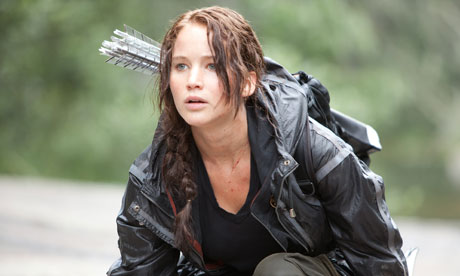
If sport is violence by other means, then reality TV is cruelty, envy, spite and group hate … by exactly the same means. The Hunger Games is an exciting dystopian fantasy-thriller on this theme, taking place in a world of circuses but no bread. It is directed by Gary Ross, and based on the 2008 young-adult bestseller by Suzanne Collins, who co-wrote the screenplay with Ross.
The entirety of North America has become a totalitarian state, traumatised by chronic food shortages; these once inspired a people's uprising in outlying regions, which was brutally suppressed but the relevant communities "forgiven" on condition that they annually supply 24 young people by lottery to compete in a televised survival contest in a fenced-off woodland arena, provided with weapons and food, fighting with the elements and each other until only one remains alive.
In this way, the authorities hope to siphon off the people's tendency to violence and resentment. At first terrified, the chosen contestants are soothed by the pre-contest period: they had been living in dirt-poor rural areas that have regressed to a parody of 19th-century pioneer austerity, like something out of Laura Ingalls Wilder. But the chosen teenagers are brought to a gleaming futurist metropolis beyond their dreams, where people dress with absurdly obvious decadence and foppery. Lavished with food, luxury, top-notch athletic training and the intoxicating thrill of celebrity, they begin to glow: sacrificial lambs who think they're rock stars.
Among them are tough, level-headed Katniss Everdeen (Jennifer Lawrence) and Peeta Mellark (Josh Hutcherson), two people with some emotional history together. When Peeta confesses his feelings for Katniss and the ratings explode, the thought of lovers who must fight each other to the death begins to electrify the TV public, and requests for a rule change are pressed on the malign president, played, perhaps inevitably, by Donald Sutherland. But is Peeta just playing to the cameras?
The Hunger Games is partly an entertaining throwback to satirical pictures such as Norman Jewison's Rollerball (1975) and Sidney Lumet's Network (1976), although those movies had a very adult, sexy-sleazy feel; The Hunger Games is notably chaste, despite all the fighting. It could also have been inspired by Kinji Fukasaku's Japanese nightmare Battle Royale (2000) and Daniel Minahan's excellent and underrated satire Series 7: The Contenders (2001). The film also awoke in me a very happy memory of the classic first-season Star Trek episode "Arena", in which Captain Kirk is teleported to a uninhabited planet where he has to fight the giant reptilian Gorn, and is told there are raw materials there to create a weapon, if only he can find them.
But these points of reference existed before reality TV took its grip. Suzanne Collins's Hunger Games, on the other hand, has been created by and for people who have grown up with it. Now pop culture is steeped in Pop Idol, American Idol and all the other reality shows in which young people are ritually exposed or humiliated or capriciously promoted to headspinning, temporary fame. The Hunger Games reflects a weird kind of post-ironic accommodation: it doesn't read as satire in quite the same way. The vicious use of Warhol's 15 minutes to oppress and cheapen the public is not presented with distancing black comedy, more a protracted growl of pain.
Yet the vinegary tang of satire is still there. When Katniss has to demonstrate her archery skills to the drawlingly callous judges, she sneers: "Thank you for your consideration." Could this be a sly dig at the campaign language for Academy award nominees? I laughed at Sutherland's shrewd dismissal of the Hollywoodised "sympathy" narrative: "There are lots of underdogs in this world," he snaps, "if you could really see them, you would not root for them either."
Just as in The X Factor, the contestants have preening mentor-figures – here they are Haymitch Abernathy (Woody Harrelson), Effie Trinket (Elizabeth Banks) and Cinna (Lenny Kravitz). And just as in Big Brother, warring contestants make short-term alliances to manage the outcome, to prolong their presence in the contest, but also because a sociable denial-mechanism is hard-wired into them: for much of the time, they behave as if death is not looming. Reality television's horrible fascination, amplified here, is that we can see this on our screens; they can't. The humiliation of failure on a real reality show is mortifying: the contestants' non-celeb ordinariness counts against them, and their dignity levels plunge well below zero. A living death?
The Hunger Games is a very enjoyable futurist adventure, presented with a compelling, beady-eyed intensity. The worry now is that with big-screen versions of the next books in Suzanne Collins's series coming down the line, the impact will be lessened, and it will become a Twilightish soap. Already there is a hint of a Team-Jacob-vs-Team-Edward conflict as Katniss may have her eye on another hunk, Gale (Liam Hemsworth). For the time being, however, this is supremely effective entertainment.

